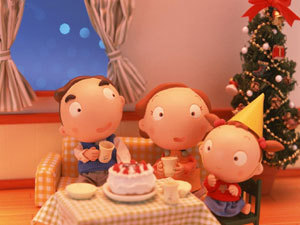The freedom-loving couple quit their jobs in foreign companies in 2005 to open a small bar. Most of the customers are expats. The couple has learned about the world through speaking with guests from around the globe.
"They think differently from us," Liu's wife says.
"For instance, a 20-year-old Frenchman said he'd return to France to learn how to bake bread. Most Chinese believe people his age should go to university to enjoy a better future."
She believes some Chinese kids are too dependent on their families because they don't have the opportunity to explore the world.
A 2010 Horizon Research Consultancy Group survey found urban and suburban Chinese postponed their expected ages for childbirth by an average of 2.1 years because of such practical concerns as finances and home ownership.
Couples with a total monthly income of 8,000 yuan ($1,280) in big cities, such as Beijing, Shanghai and Guangzhou, were likelier to say they'd consider parenthood.
But some DINK couples fear rising living costs. Others want freedom and believe raising children is too wearisome. Some worry about pollution and food safety.
Fu Duoduo simply doesn't like kids.
"I don't want to be around them," says the 30-year-old, who works in a State-owned company in Hunan's provincial capital Changsha.
"And China's environment isn't good. Even if conditions were better, I wouldn't want children."
She and her 32-year-old husband Li Zhao married this year.
They use contraception but have no idea what they'd do if she got pregnant. They're considering tubal and oviduct legation.
Her husband doesn't want kids because his parents always fought when he was a boy.
She wants freedom.
Her parents accept her DINK aspirations. But her mother-in-law really wants a grandchild.
"We won't change our minds," Fu says. "Crying, noisy kids are disruptive and annoying. We always think we're each other's kid. I'm amazed some couples decide to have a second child. They probably feel the same about us not wanting kids."
Fu and Li can wake up naturally on days off work. They don't face economic pressures - aside from investing to provide for retirement, since children usually care for parents in their old age.
"My colleagues and friends think we're unusual," Fu says.
"But we cause no harm. We can even cover for coworkers because our time is freer. We're much better than people who have kids but don't raise them. You have to be who you are and never compromise for anyone."
Singles with DINK aspirations often struggle to find spouses.
Fu and her husband met in a local QQ instant messenger DINK group.
Online DINK sites have flourished in China in recent years. There are groups for singles and couples, local and national forums - you name it.
She'd previously dated a divorced man with a child so she wouldn't have to undergo childbirth and because she couldn't find a man seeking a DINK partnership before meeting her husband.
Her husband couldn't find a girlfriend with DINK ambitions until he met his ex online. He quit his job, sold his property and moved from Beijing to Changsha.
The couple broke up.
Then Li met and married Fu.
"Living DINK means I can control my life and live as I wish," says Li, who runs his own company.
"I can live happily with my love for the rest of my life and pursue the lifestyle I long for, regardless of others' opinions."
He says their life is quite simple. They don't have the conflicts that might arise from raising kids. In many families, for example, raising children creates tension between mothers- and daughters-in-law.
"And some couples become more concerned about the kids than their spouses and neglect their partners' feelings," Li says.
"The sense of loss affects relationships. But we don't have this problem."
His mother sometimes says she wants a grandchild but knows she won't get one. After much discussion, she has come to support her son's decision.
While most women her age are raising grandchildren, she travels often with friends and spends time on online social networks.
"I think my mother's life is much better than other old people's. My choice has made her golden years better."
But some couples who wed with a DINK mindset experience a situation in which one partner changes his or her mind - either independently or because of parental pressure.
If the partners can't compromise, such couples might find their marriages on the rocks. And some couples have babies due to accidental pregnancies.
DINK couples' divorce rates are twice that of those with children, China Marriage and Family Counseling Center deputy director Ming Li explains.
That's because children are traditional families' reinforcing bonds. And it's easier to divide property than kids.
"DINK families are simpler but less stable," Ming says.
"Many have pets they treat like children. I suggest they don't get divorced because they don't have kids and keep the babies from accidental pregnancies."
Li says: "Singles who want to live DINK are very cautious about choosing partners because the decision affects the rest of our lives. We need to communicate a lot to ensure our personalities are compatible. Many people who want to live DINK would rather stay single if they don't find true love."
Chinese Academy of Social Sciences' Institute of Sociology's family and gender studies director Wu Xiaoying says: "Most people think kids are the product of their love and can sustain it. But I believe marriage is a bit fragile in this era. Becoming DINK is only a choice - nothing so special."
She believes people become DINK for various reasons. For example, Chinese marry at a relatively late age because it takes years to finish higher education. The pressure to marry and have children comes when they're still struggling to get promoted.
"Lifestyles were uniform in China's past," Wu says.
"If you were different, you'd be scorned and face social pressure. In today's China, there are not only DINK but also single people. This is because of progress. Everyone can freely choose their lifestyles."
Contact the writer at xulin@chinadaily.com.cn.
|
 |
 |
